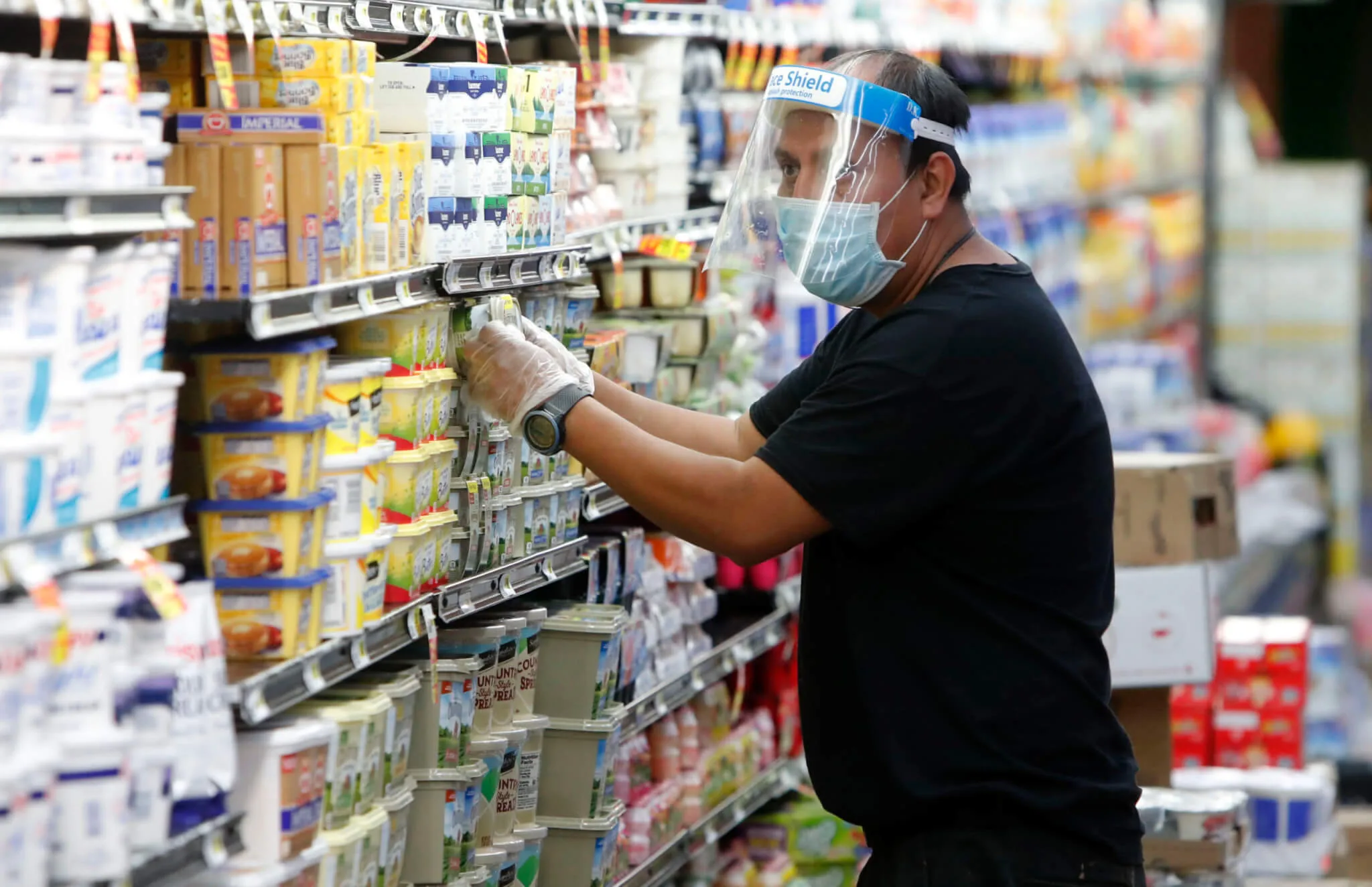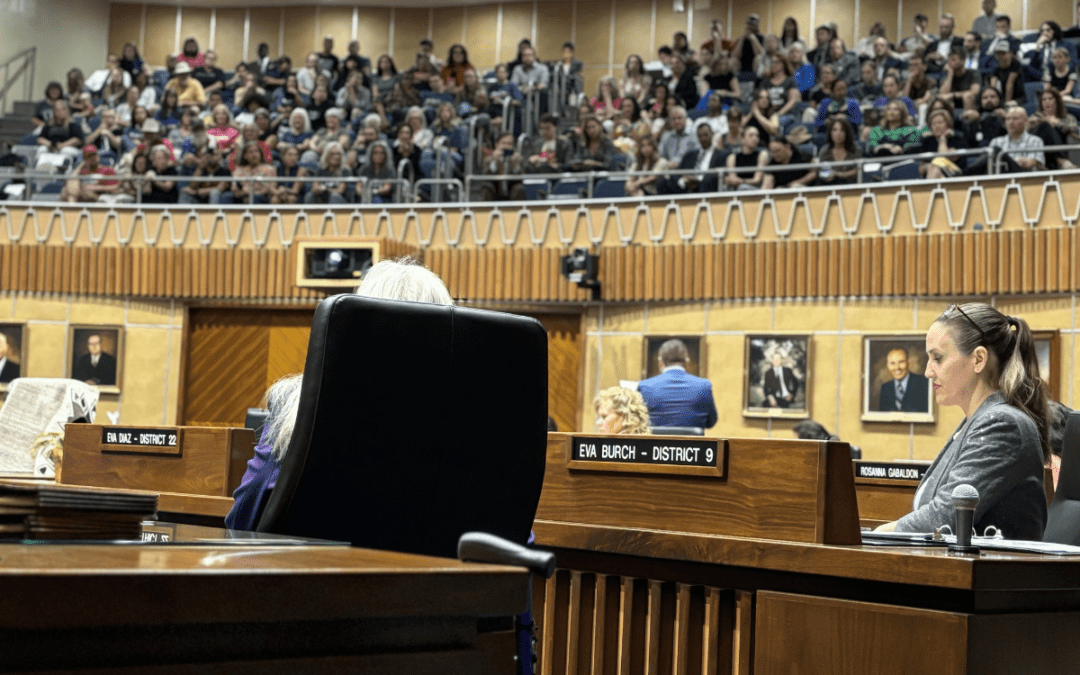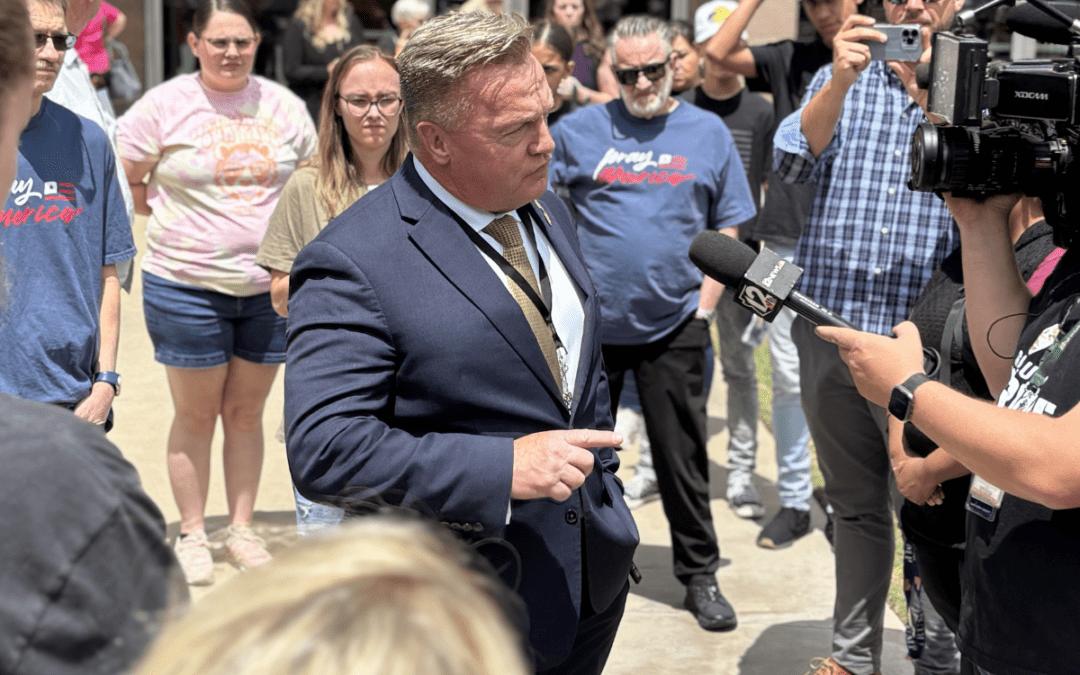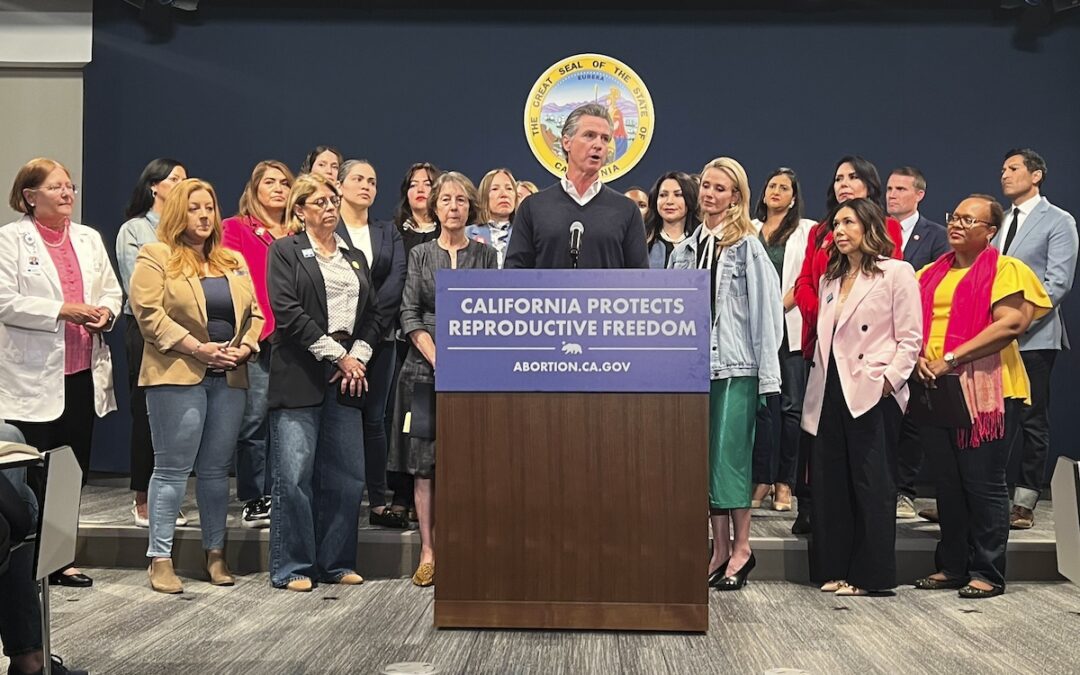
Amid concerns of the spread of COVID-19, a worker restocks products at a grocery store in Dallas, Wednesday, April 29, 2020.
Grocery store employees are not considered among the priority groups currently being vaccinated in some of the state’s most populous counties.
Cindy Vargas has worked at a Fry’s Food store in Phoenix for 17 years. She’s worked as a cashier, fuel attendant, and now as a pharmacy technician. She knows firsthand just how many people grocery store workers come in contact with on a daily basis.
That’s why—one year into the coronavirus pandemic that has infected more than 800,000 people and killed more than 15,000 in Arizona—Vargas is questioning why her colleagues are still unable to get vaccinated.
“It is scary. People are still getting sick,” she told The Copper Courier. “The public comes into our store all day. We’re open 12 hours a day, and that store is packed 12 hours a day.”
As Arizona approaches the one-year anniversary of the first stay-at-home order of the pandemic, many grocery store workers working on the front lines still have yet to be vaccinated.
Arizona’s vaccine distribution has rolled out in phases since the first doses of the vaccine arrived in December.
Currently, most counties across the state are vaccinating healthcare workers, long-term care residents, teachers and childcare workers, law enforcement and public safety employees, and adults 65 years old and older.
Last week, James McLaughlin, president of the Arizona chapter of the United Food and Commercial Workers union, which represents 24,000 workers across the state, sent a letter to the state’s public health director Dr. Cara Christ, asking that essential grocery and food workers also be prioritized for vaccination.
“Our ‘essential’ members in Maricopa County and elsewhere are not being treated with the urgency that anyone familiar with the food chain can see immediately,” McLaughlin wrote.
“It is urgent that these workers be immediately inoculated to not only protect their lives, but the lives of all our residents and all our other essential workers.”
How Is The State Prioritizing Workers?
Grocery store employees and food and transportation workers are included in Phase 1B of the state’s vaccine rollout, but are not considered among the priority groups currently being vaccinated in some of the state’s most populous counties.
Some counties are already vaccinating all of the groups in that phase, including Coconino and Yavapai counties. But Maricopa and Pima counties, the most populous counties in the state, are not.
Bob Grossfeld, a spokesperson for UFCW Local 99 in Arizona, told The Copper Courier that it was disheartening to see workers who were considered essential in the eyes of the public at the start of the pandemic now not being prioritized during the vaccine rollout.
“People gotta eat. If they’re going to put food on the table, they’re going to come into contact with our members,” Grossfeld said. “For whoever is making these decisions to not see that … it’s not making any sense.”
On Friday, Christ said that different counties across the state can prioritize different groups based on the limited numbers of vaccine doses. She also said the state has received numerous letters from different industries asking to be prioritized in the vaccine rollout.
“It’s going to depend on the numbers of the estimated population of each of those groups and where that falls in the priority. In one county they may prioritize agriculture…whereas another county may prioritize transportation or grocery stores,” she said. “It’s going to be left up to the counties.”
In Maricopa County, prioritized groups in Phase 1B were selected based on recommendations from the federal Advisory Committee on Immunization Practices and Arizona’s own Vaccine and Antiviral Prioritization Advisory Committee (VAPAC), according to the county’s website.
VAPAC has not released recommendations for essential workers to get the vaccine, according to a spokesperson for Maricopa County.
“Once they do, Maricopa County will review those recommendations and implement a program that works for our community,” spokesperson Ron Coleman said.
On Monday, the state announced that local county health departments could prioritize frontline essential workers through “employer-based vaccination strategies.”
Coleman said the county was working with the state’s new guidelines and guidance from the CDC’s Advisory Committee on Immunization Practices to come up with a timeline on vaccinating essential workers, but also said that the county was still dealing with a limited supply of vaccines.
The county will have more details on when essential workers could be vaccinated next week, according to Coleman. “This decision provides some much-needed direction to our residents and our public health team,” he said.
Pima County said Monday that it would move on to vaccinating all essential workers only when 55% of the people its current priority group, or people age 65 and older, had been vaccinated. As of Monday, Pima County had vaccinated 47.7% of people age 65 and older.
Vargas, who was ultimately able to be vaccinated as a pharmacy worker, says she just wants the same for her colleagues.
“Arizona state leaders, please, please I beg you. Push up the grocery store workers to get vaccinated,” she said. “We are getting sick every day.”

Grocery Store Workers Getting Sick ‘Every Day’
When the pandemic hit, Vargas said she and her colleagues’ stress levels were through the roof.
They still are, she says, as employees have to deal with different members of the public coming in and out of their stores every day.
As a pharmacy technician, Vargas says she sanitizes the countertops in her workspace every hour, as do the Fry’s cashiers. Plexiglass panels were also installed between the cashiers and the customers, and all Fry’s employees are required to wear masks.
The store has also asked that customers wear masks, but without enforcement, she says it’s common to see customers coming in without a mask.
Additionally, Fry’s workers only received hazard pay, a $2-an-hour boost in pay that was given to employees for working under hazardous conditions, at the beginning of the pandemic for approximately two months.
The United Food and Commercial Workers union has recently made a push to demand hazard pay for its workers, including by soliciting support from the public.
Kroger, the parent company that owns Fry’s, closed two of its stores in Seattle after the city passed a law mandating that companies pay grocery workers $4 an hour in hazard pay, according to the Seattle Times.
Earlier this month, Fry’s Food Stores also reached a labor contract agreement with UFCW Local 99, which will impact 19,500 employees working at 123 Fry’s stores across Arizona, according to the Phoenix Business Journal.
Grossfeld said he couldn’t share specific details about the union’s contract negotiations, but contracts typically cover employee wages, benefits and processes for handling complaints.
Grossfeld also said that historically, during times of crisis or malady like the current pandemic, union membership typically tends to increase.
“They’re looking for help. Where do you go to get the help if you don’t have a union?” he said.
Today, Vargas says sales at Fry’s are through the roof, but she hears about someone getting sick every day, either at her store, other locations, or in a Facebook group that she’s in with other Fry’s employees.
“It’s a little scary to go to work every day, not knowing what’s going to happen or if we’re going to catch it and take it home to our families,” she said. “That’s the scariest part.”
This story has been updated with new information regarding Pima County’s vaccination rollout.
Reach the reporter at [email protected] or 480-243-4086.
Politics

Democrats successfully force vote on repealing 1864 abortion ban, passes House
The Arizona legislature moved forward two bills Wednesday that would repeal the state’s 1864 abortion ban. A bill to repeal the ban has been...

State Official: 1864 abortion ban gives Arizona ‘black eye’
Arizona’s role at the forefront of the climate crisis, defending democratic elections, and protecting reproductive rights has caught the attention...
Local News

Arizona Sens. Anthony Kern, Jake Hoffman, indicted for fake election scheme
Eighteen individuals involved in a conspiracy to overturn Arizona’s election results in 2020 were indicted by a grand jury Wednesday and charged...

Gov. Gavin Newsom wants to let Arizona doctors provide abortions in California
California law generally allows abortion up to the point of fetal viability, which is around 24 weeks. SACRAMENTO, Calif. (AP) — Arizona doctors...




